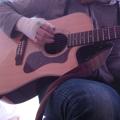Leth reviewed A Wizard of Earthsea by Ursula K. Le Guin (The Earthsea Cycle, #1)
Wonderful story
4 stars
A great story that straddled the line between literary and pop much better than the shoplit I've been listening to lately. I love a yarn about some guy going to some place and having misadventures along the way, I sure do. Better yet the themes of pride and the balance with nature and each other that comes from a devotion to living well. To living with mistakes as well as coming to terms with them as we try to make it right. IDK, I have a cold.
Libby Audiobook, Recorded Books.
A great story that straddled the line between literary and pop much better than the shoplit I've been listening to lately. I love a yarn about some guy going to some place and having misadventures along the way, I sure do. Better yet the themes of pride and the balance with nature and each other that comes from a devotion to living well. To living with mistakes as well as coming to terms with them as we try to make it right. IDK, I have a cold.
Libby Audiobook, Recorded Books.













